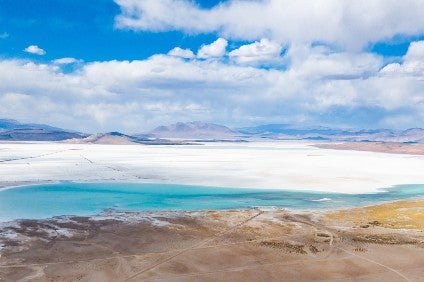
BMW said it would source EV battery lithium from a second supplier, US-based Livent.
The value of the multi-year contract will total around EUR285m and Livent will supply the lithium directly to the group's battery cell manufacturers from 2022.
By 2030, at least half the automaker's global sales are expected to be fully electric vehicles, increasing the need for lithium.

Discover B2B Marketing That Performs
Combine business intelligence and editorial excellence to reach engaged professionals across 36 leading media platforms.
"Lithium is one of the key raw materials for electromobility. By sourcing from a second supplier, we are securing requirements for production of our current fifth generation of battery cells. At the same time, we are making ourselves technologically, geographically and geopolitically less dependent on individual suppliers," said BMW purchasing chief Andreas Wendt.
The group previously signed a contract for lithium from hard-rock deposits at Australian mines back in 2019. Now, the company is broadening its supplier base and additionally sourcing lithium from Argentina where the material is obtained from brine from salt lakes. Livent employs an innovative method, that emphasises sustainable water use and minimises the impact on local ecosystems and communities. The company will also contribute important data to a study of sustainable lithium mining initiated by the BMW Group.
The salt lakes in the border region between Argentina, Bolivia and Chile are home to roughly half the world's lithium reserves. In conventional lithium mining, brine from the layers below the salt lakes is pumped out of the ground and evaporated in shallow basins.
Livent obtains lithium from a brine resource in northern Argentina, using a proprietary method that is particularly sustainable. To minimise the impact on the surrounding ecosystem, most of the brine used is returned directly to the surrounding habitat and not evaporated. This largely preserves the balance between the brine layers and groundwater layers. Solvents and other chemicals do not come into contact with the environment during this process. It also takes up much less space, since evaporation basins are barely used. The company is also involved in local educational programmes and infrastructure measures.
The BMW Group and BASF commissioned a scientific analysis of the water use of different lithium mining methods in South America from the University of Alaska Anchorage and University of Massachusetts Amherst in late 2020. The study will investigate the impact of lithium mining on local water resources and the surrounding ecosystems.
The aim is to improve the scientific understanding of the relationship between fresh water and lithium brine aquifers, to evaluate different technologies and thus provide the foundation for assessing sustainable lithium mining. The study will provide companies with a scientific basis to make more informed decisions on sustainable lithium mining in Latin America. The results of the study should be available in the first quarter of 2022.






